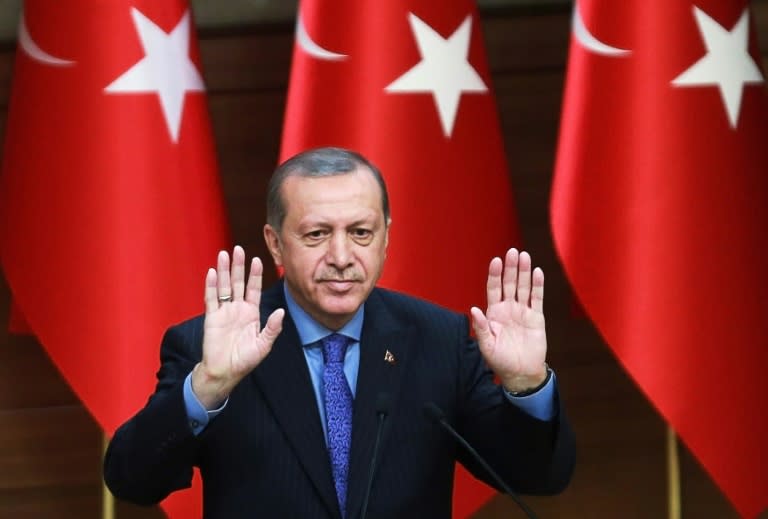New Erdogan powers 'huge threat' to democracy, rights group warns

Plans to dramatically bolster Turkish President Recep Tayyip Erdogan's powers pose a "huge threat" to human rights, law and the country's democratic future, Human Rights Watch (HRW) said Wednesday. Condemning proposed changes to the Turkish constitution, the US-based rights watchdog said the bill going through parliament Wednesday in its second reading would "concentrate unchecked power in the president's hands". The proposed changes, which will create an executive presidency for the first time in modern Turkey, are controversial and far-reaching, with HRW claiming they would "weaken parliamentary oversight of the executive". Erdogan's supporters say the plans would simply bring Turkey into line with countries like France or the United States, and are necessary for effective government and to avoid the need for fragile coalition governments. The president will have the power to appoint and fire ministers, while the post of prime minister will be abolished for the first time in Turkey's history and replaced by single or multiple vice presidents. An MP from the ruling Justice and Development Party (AKP) said the structure of Turkish domestic politics would "no longer be indecisive but will take a very clear shape" under the new system. "This will automatically bring stability in society, so very productive policies will emerge," Ibrahim Aydemir told AFP. Late Sunday, the parliament backed the two final sections of the 18-article new constitution after a marathon week of debating that began on January 9 and included sessions that often lasted late into the night. The articles were being debated late Wednesday and if approved by at least 330 votes in the 550-seat assembly, a referendum could take place as soon as the start of April. - Erdogan defends plans - The president and the parliament would also together be able to choose four members of the 17-strong Supreme Board of Judges and Prosecutors (HSYK), a key judicial council that appoints and removes personnel in the judiciary. The parliament would choose seven members on its own. Erdogan criticised the current system Wednesday during a speech in Ankara, saying the new system "redefining relations between the legislative, executive and judicial powers with a democratic understanding would not be a loss for Turkey but a great gain", without giving further details. But Hugh Williamson, HRW Europe and Central Asia director, said the changes would "further erode already weak checks and balances on the exercise of that power". He urged parliament to reject the changes that "would hollow out the rule of law, and profoundly undermine the country’s democracy". The watchdog criticised the government rushing through a bill during a state of emergency and accused it of restricting public debate while dozens of media outlets had been shut down. The emergency has been in place since the attempted overthrow of Erdogan last July. Main opposition Republican People's Party (CHP) lawmaker Nihat Yesil described the bill as "regime change". "The Turkish population, in these conditions, facing so much pressure and persecutions, can't give their opinion in such an unbalanced referendum."

